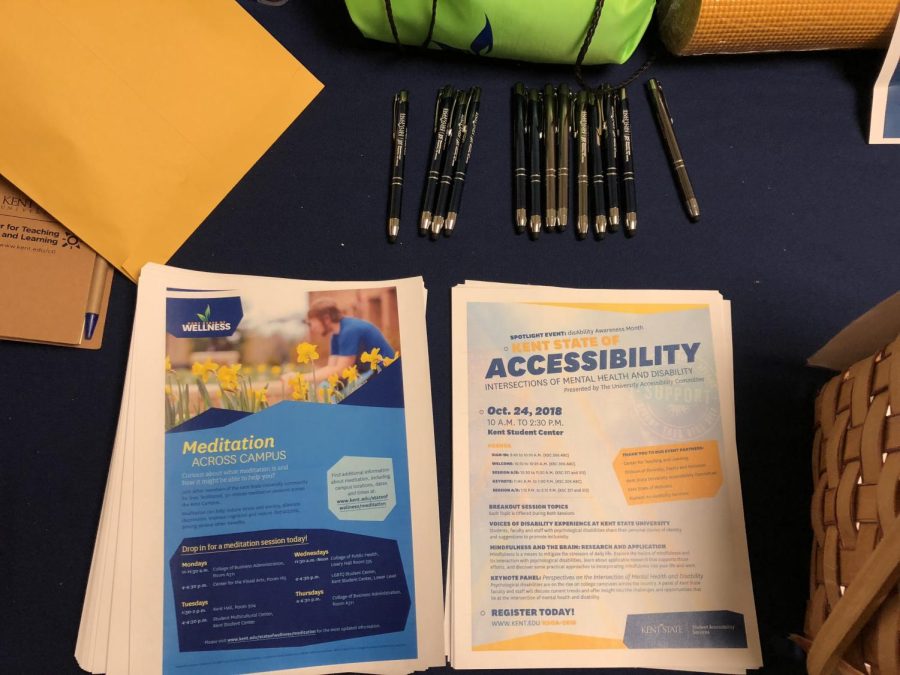KSU gives students and faculty opportunity for dialogue about mental health
October 24, 2018
Kent State of Accessibility hosted its second annual Intersections of Mental Health and Disabilities on Wednesday, giving students the opportunity to speak on their struggles with mental health and what professors and advisers can do better to assist students with similar struggles.
“We had all audiences in mind when creating this event,” said Ben Hollis, the director of instructional design and Kent State Online and the co-chair of the accessibility Committee. “This is Disability Awareness Month, so for this event in particular, we can throw more resources in and take a day to focus on mental health and the volume of services we offer here at Kent State.”
The event consisted of three parts: Voices of Disability Experience at Kent State University, Perspectives on the Intersection of Mental Health and Disability and Mindfulness and the Brain: Research and Application.
Junior digital science major Brittany Mack, junior visual communication design major Emily Dever and senior business management major Kayden Maclay were among the panel of students who spoke during the Voices of Disability Experience session.
Each of the panelists described their struggles with mental health and disabilities as a student at Kent State, and all agreed they’ve found themselves struggling to advocate for themselves against professors or faculty who may not understand their situation.
“I try to explain [my chronic illness and mental health] to professors as much as possible,” Mack said during the panel session. “But there’s still the question in the back of their mind, ‘OK, why does that inhibit you? What does that have to do with you not making up assignments?’ And it’s understandable for those who don’t deal with it personally.”
Professors receive a letter each semester if a student in their class needs to utilize Student Accessibility Services in order to go through with the class. These letters do not specify what the student is struggling with, so it is left in the hands of the student or professor to reach out for more information.
Mack, who has been with her service dog, Merlin, for over a year, was diagnosed with depression at the age of 13. She has been taking advantage of Kent State’s accessibility services since the start of her enrollment at Kent State.
“I like when professors do reach out and aren’t afraid to ask, because I know there is a line drawn for personal privacy,” Mack said in the panel session. “When a professor comes to you and says ‘Hey, what can I do? Here are the things I can help with you with; if you need anything else, let me know, and I’ll try to do my best.’ Something like that is really important.”
Dever, who struggled with eating disorders and depression, expressed her frustrations with the conflicts between her mental health and the issues it creates with her schedule and professors.
“The professors that tell me that I need a doctor’s note and then make me have to reach out to a higher department head, those are the ones who frustrate me,” Dever said during the panel. “But you can’t get mad at them because they are trying to just go by the book. But at the same time, we’re not by the book when we’re struggling with this. There’s no status quo.”
The students on the panel also each had their own insightful interactions between them and their professors at Kent State.
“I had professors say, ‘We’re going to bring this up today; if you need to step out for a couple minutes, you’re more than welcome to,’’ Maclay said in the panel discussion. “For professors to be able to say, ‘If this doesn’t sit right with you or upsets you, take a break. Come back in a couple minutes when you’re OK,’ is a great thing.”
Intersections of Mental Health and Disabilities was created to bring together the Kent State community to talk about disabilities and mental health issues that sometimes go unnoticed. “Invisible disability” was a phrase thrown around quite often throughout the event.
“We want to have an open-dialogue,” Hollis said. “When something is a physical disability or physical ailment, if you’re limping around because your leg is hurting, you get medical attention. But maybe not so much with things that are invisible to us. So if there is a prevalence of these needs, we want to guide students, faculty and staff to our resources and create a language between us at Kent State.”
Director of Student Accessibility Services Amanda Weyant helped in finding students for the panel and participated in the Perspectives on the Intersection of Mental Health and Disability panel herself.
“The student voice piece is my favorite part of the day,” Weyant said. “I think it’s easy to go through our day and to sort of generalize things or think of students as a group. But it really personalizes something for a student to tell their individual story. It builds a lot of empathy.”
Lexi Marco is the health reporter. Contact her at [email protected].












